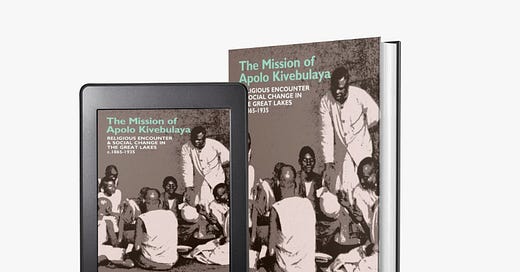Welcome to my newsletter, “Global Witness, Globally Reimagined.”
I dream here about mission in a postcolonial world. Every week, I share one thought that has spoken to me, two resources I trust will be helpful to you, and three quotes about mission.
I pray one of these will energise you this week.
1. Thought I Can’t Shake Off
It is a well-accepted fact that Africa has been evangelised by Africans. Of course, the same can be said of many parts of Asia and Latin America. But, for Africa, we are aware that, for several decades now, thousands of indigenous evangelists and catechists have trekked from village to village, from town to town, to make converts and disciples for Christ. Africa’s communal culture has helped along the way. Converts go on to evangelise their families, clans, tribes, etc, and before long, Christianity becomes the preferred religion for large communities.
This fact that local Christians, generally speaking, form the best evangelists and missional leaders among their own people has been known for a while. In India, Donald McGavran tells us that it was local evangelists who made the most converts and this is how the Church Growth Movement came about in the 1960s. In Africa, in 18 months between 1913 and 1915, William Wade Harris baptised 120,000 people when, in the same period, Western missionaries in West Africa baptised only 1000. Many local leaders, like Apolo Kivebulaya (Uganda, more on him below) and Harry Matecheta (Malawi), served in mission-established churches, while others, including Simeon Kimbangu and Isaiah Shembe went on to form their own denominations. Yet, with all this, the missionaries continued to form African Christianity after their own kind, with most of its theological identity shaped in the West. In the 1960s when most African states won their independence from colonial governments, the missionaries wrongly said that local Christians were not to ready to lead their own churches yet. No wonder the ongoing decolonisation of African Christianity has been a lot harder than that of the African nation-states. Yet, it is actually after the 1960s, when the leadership was passed on to Africans, that the explosion of African Christianity began. Could it be that, by not trusting local agency, the missionaries get in the way of the work of the Spirit of God?
2. Resources I am Enjoying
Book: Emma Wild-Wood, The Mission of Apolo Kivebulaya: Religious Encounter and Social Change in the Great Lakes C. 1865-1935. Suffolk: James Currey, 2020.
This week, I have enjoyed Emma Wild-Wood’s 2020 book, The Mission of Apolo Kivebulaya. In it, Wild-Wood tells the story of Apolo Kivebulaya (1864—1933), a Ugandan evangelist who worked in the Kingdom of Toro. His long story underscores the critical missional tensions that shaped the works of indigenous evangelists. I have found it extremely helpful to learn how he constructed his self-understanding back in the 1890s, (he changed his name from Waswa Munubi to become Apolo Kivebulaya, transliterated “Apollos from Europe”),1 how he downplayed his Baganda identity to serve in minority communities in Western Uganda, and how he lived out his Anglicanism while serving as a Church Mission Society (CMS) local evangelist. This deep narrative reveals the constant struggle between faithfulness to the missionaries’ message and Africanising the faith.
The Mission of Apolo Kivebulaya is a carefully written story of an African apostle. I appreciate Wild-Wood for the effort. She is extremely well-informed about Kivebulaya. Of course, she accessed Kivebulaya’s autobiography, personal letters, earlier biographies, seventeen archival collections and conducted many oral interviews. Therein lies the challenge with these kinds of work. We know that the archives are in Europe and are not easily accessible to Africans. Could an African, say a descendant of Kivebulaya, have done this? What would it take for this to happen?
We cannot effectively explore the question of mission in a postcolonial world without wrestling with theology. Yes, Martin Köhler said, “mission is the mother of theology.” But, of course, our theology shapes our understanding of mission. We cannot have a postcolonial understanding of mission while holding on to colonial theology. In this video, Kwok Pui Lan talks about a postcolonial reading of the Bible and what this implies for our theology and missiology.
3. Quotes I am Pondering
But missionary work is still heavily polluted by its past, in which the “help” being offered was used as a pretext to exploit a country and simultaneously feed the “white man’s burden” narrative. — The Bottom Line, University of California Santa Barbara.
The translation principle explicitly rejects the idea, enshrined in Christendom, that Christianity has a definitive cultural expression, that non-Christian peoples must embrace another culture as a condition for salvation. — Jehu Hanciles.
Being genuinely at home among a people and in a culture is a necessary condition for the authenticity of the Gospel wherever it is preached. Failing this, the profession of the Christian faith remains only a veneer, sooner or later to wear out. At the end of the day, this level of evangelization, or of mission, risks leaving the culture and people concerned the way they were before the encounter, substantially unchanged. —Laurenti Magesa.
Thank you, I pray you have a missionally fruitful week.
He adopted the name ‘Apolo’ to reflect his admiration for Apollos of the New Testament. Kivebulaya, which means “one who has come from Europe”, was given to him because he wore a suit under his cassock.





Especially with the adoption of western technology, oils it be argued that colonialism still exists, especially in non-western churches where tech and prosperity are seen as good examples from the west?
Some good thoughts. Love the video. Would be good to know your thoughts on whether Christianity can actually become post-colonial though, since many nations are modernising, which could be interpreted as westernising...